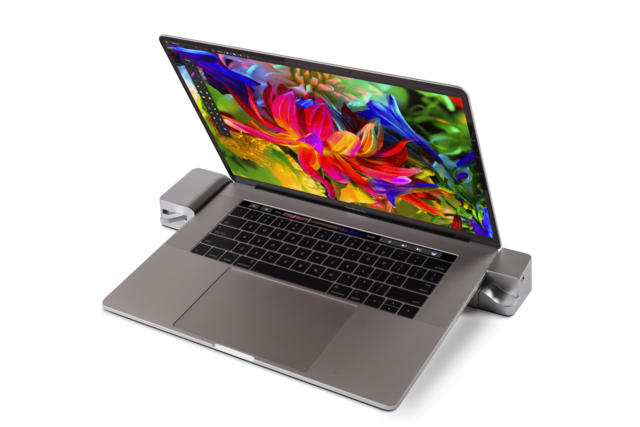
Skills required for a cyber security career have changed
As we saw earlier this week, the cyber security industry is looking for new blood in order to solve the skills crisis.
Another study this week by security and compliance firm Tripwire underlines this, with 81 percent of existing security professionals believing that the skills required for the job have changed in the past few years.

Hide 'running in the background' Notification app for Oreo does exactly what you'd hope
While there is a great deal to like about Android 8.0 Oreo, the latest version of Google's mobile operating system is not without issues. Some users are wondering whether or not their phones will get the upgrade, and some who have upgraded are experiencing problems with data usage.
One niggle that has caused a lot of complaints is Oreo's notification that there are apps running in the background. It's Google's attempt to warn people about apps that might be draining their battery, but many people are more than a little irked by the pestering. Thankfully, there's a free app to kill the irritation.

Night mode comes to Twitter on the web
Android and iOS users who like to browse Twitter in bed were pleased when a night mode was added to the mobile apps, saving middle-of-the-night blindings. Now night mode has made its way to the web.
Whether you see night mode as an eye-saving feature, or just a way to get in touch with your inner goth, the arrival of the feature has been long-awaited by users.

Why your business is a target for hackers
Although cyber attacks regularly make the headlines, it's easy to fall into the trap of thinking that it can’t happen to your business. You might think that you’re well protected or that you’re too small to worry about.
A new infographic from communications and cloud company CBTS reveals why everyone is potentially at risk.

Drive File Stream launches for G Suite users as Google kills off its Drive software
Google is deprecating the Google Drive software for PC and Mac as it launches Drive File Stream. The company plans to support the cloud storage software for just three more months before killing it off completely in six months.
Starting in October, Drive users will begin to be shown messages informing them that their software is going away. Users with both Drive File Stream and Backup and Sync will be prompted to stop syncing My Drive with the latter. It's a move from Google that is likely to cause confusion among users.

OnePlus 3 users treated to Android Oreo beta -- OnePlus 3T and 5 won't be far behind
True to past form, OnePlus is not hanging about in getting Oreo pushed out to its smartphones. It's early days at the moment, but OnePlus 3 owners can already download a beta version of Android 8.0 for their devices.
The update is only available to members of a closed beta group at the moment, but a public beta is due by the end of September. OnePlus has not indicated exactly when the 3T and 5 will receive the beta, but the update is on the way.

Microsoft enterprise apps will arrive on Huawei Cloud
Huawei has revealed a new tie-up with Microsoft as it looks to improve the world of public cloud.
At the Huawei Connect 2017 event in Shanghai today, the Chinese giant has confirmed it will expanding its partnership with Microsoft to allow the latter's enterprise apps to come to Huawei Cloud.

LandingZone announces Docking Station for Apple MacBook Pro with Touch Bar
Thanks to the MacBook Pro, the popularity of Thunderbolt 3 and USB-C docks and dongles has exploded. If you have accessories that use USB Type-A, for instance, they simply won't work with Apple's latest laptop without the use of an adapter. Heck, the machine does not even feature a standard video-out port, so an HDMI, VGA, or DisplayPort dongle must be utilized.
If you use your MacBook Pro as a makeshift desktop with a monitor, keyboard, and mouse, investing in a dock or docking station would be a wise move. Today, a new such product from a company called "LandingZone" caught my attention. While I am not familiar with the company, the docking station is quite intriguing. It is one of the most complete MacBook Pro dock solutions I have seen, featuring many useful connection options and the ability to charge the laptop, of course. It is designed as a traditional docking station too, where Apple's laptop actually locks into the product as opposed to being more of a hub.

Virgin Atlantic will offer Wi-Fi on all flights
Frequent flyers will soon be able to stay online whenever they fly after Virgin Atlantic revealed details of a new in-flight Wi-Fi connectivity plan.
The airline has confirmed its entire fleet will now be able to get Wi-Fi during flights around the world, with all 39 aircraft now connected, even on transatlantic flights and those carried out by Virgin's US partner network Delta Air Lines.

How to make Android and iOS apps smaller
In an ideal world, if you were the sole provider of any service through app and the users had unlimited resources on their devices, there would be no question of optimization and terms like agility and even user experience would be redundant. But as you might know, the current state of app industry is anything but ideal. There are dozens of apps competing for even the simplest of services and no matter how premium device a user has, there is always a limit to the number of apps it can operate smoothly.
The worst part, however, is scenario where after spending considerable amount of time, money and resources into developing and marketing an app, the users perceive it to be bulky and either never install it or uninstall after they find the memory it consumes is disproportionate to the value it brings.

Renogy Lycan Powerbox can provide electricity during a storm such as Hurricane Irma
The United States has been heavily under attack from Mother Nature lately. Hurricane Harvey caused horrific devastation in Texas, and now Irma is headed for Florida. During these disasters, it is not uncommon to lose electricity. This can be a huge pain point, as people need devices such as cell phones to call for help -- a device with a depleted battery is pretty much useless. Not to mention, some folks have medication that requires refrigeration, so a loss of power could actually lead to death or sickness.
Thankfully, companies sell generators to keep the power flowing during an electricity outage. For prolonged outages, there are even models with solar charging capabilities. Today, a company called Renogy unveils a heavy-duty battery backup generator that can be charged using the sun. Impressively, the company claims it can keep a refrigerator running for about 8 hours! It is even on wheels so it can be easily transported. The fact that it has so many connection types, including USB Type-A , should make it indispensable during a hurricane or simply on a family camping trip.

Resilio Sync enables you to sync and share files without the cloud
There are many cloud-based synchronization services, including Dropbox, Google Drive, SugarSync and others. These services all use the same method of synchronizing your files. Choose the data you want across your computers and the content is uploaded to the cloud and then made available across your other devices.
The issue here can be if you don't have fast broadband, making uploading huge files problematic. The answer is a peer-to-peer service where your data remains on one device whilst it’s synchronized to others, whether you own these devices or they are authorized users.

T-Mobile will give you free Netflix in time for Stranger Things Season 2 -- here's how to get it
T-Mobile may not be the best cell carrier from a coverage perspective, but it provides its users with a lot of value. The company and its foul-mouthed CEO, John Legere, often use outside-the-box thinking to disrupt the mobile phone industry. For instance, the company once gave free Domino's pizza to its customers through its "T-Mobile Tuesdays" scheme. Even without the added bonuses, its unlimited service is quite affordable compared to, say, Verizon.
Today, T-Mobile is once again giving away something for free, but it is much better than some cheap chain-restaurant pizza. You see, subscribers to its T-Mobile ONE family plans will now get free Netflix! This is well-timed, as the hit series "Stranger Things" returns to the streaming video site next month with season two. Of course, Netflix has much more content than that -- a solid library of original programming and a less-impressive collection of ho-hum films. The complimentary "Netflix On Us" subscription is not automatic, however -- users must activate it.

Symantec: hackers could target US and European power grids with Dragonfly 2.0 attacks
Researchers at Symantec have warned that a "sophisticated attack group" is targeting the energy sector in Europe and North America, and has been doing so for some time. A group known as Dragonfly has been detected carrying out attacks since 2011, and the campaign of attacks was recently stepped up a gear.
Dubbed the Dragonfly 2.0 campaign, the attacks included disruption to the Ukrainian power system in 2015 and 2016. After a quiet period, the group's activities have started up again, with targets hit in US, Turkey and Switzerland. On the hit list are energy facilities -- something that could have devastating consequences.

Box offers cloud services to London Metropolitan Police
London's law enforcement forces are about to get a significant storage upgrade thanks to a new partnership with Box.
The online storage giant has announced that it will now be working with the London Metropolitan Police to provide 50,000 staff with better cloud provision.


